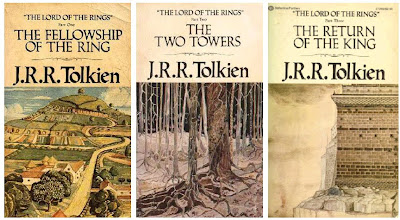
I discovered recently that there is an exhibition at the Bodleian Library in Oxford, England on the life and remarkable achievements of J.R.R Tolkien. Tolkien: Maker of Middle Earth is described this way:
This exhibition will explore the full breadth of Tolkien's unique literary imagination from his creation of Middle-earth, the imagined world where The Lord of the Rings, The Hobbit and his other works are set, to his life and work as an artist, poet, medievalist and scholar of languages.
Tolkien survived World War I and the bloody battle of the Somme. While many were crushed by the horrors of war they informed his writing.
His grandson, Simon Tolkien, reflects that his grandfather was deeply affected by the "industrial evil" of war, which is portrayed through the desolate landscapes of Mordor and the slave-like Orcs of Sauron. In a BBC article Simon offers:
My grandfather, JRR Tolkien, died when I was 14. He remains vivid to me but through child-like impressions – velvet waistcoats and pipe smoke; word games played on rainy afternoons in the lounge of a seaside hotel or standing on the windy beach down below, skipping flat black pebbles out across the grey waves; a box of matches that he had thrown up in the air to amuse me, rising and falling as if in slow motion through the branches of a horse chestnut tree.
These memories did nothing to illuminate who my grandfather was or how he thought beyond a sense of wise benevolence arching over me like that tree. Nothing except for his religion: I remember the emotion in his voice when he recited prayers with me in the evening – not just the Hail Mary and the Our Father but others too - and the embarrassment I felt at church on Sundays when he insisted on kneeling while everyone else stood, and loudly uttering responses in Latin when everyone else spoke in English.
It's been pointed out that for all the strengths of the Bodleian exhibition its great weakness is that it ignores the Christian faith, expressed in Roman Catholicism, which informed Tolkien's life so thoroughly.
I wonder why this aspect of his life was omitted? Are we in a time when religion is seen as an embarrassment, some sort of frailty? Do curators assume that identifying individuals as Christian will somehow alienate potential visitors. It's rather sad, but I'm grateful for his profound faith which no doubt sustained him in the trenches and informed his creative imagination.

No comments:
Post a Comment